Saab Develops Concept for Remotely Operated Rescue Craft
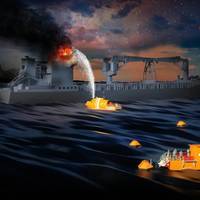
A new-generation rescue craft proposed by Saab’s Docksta Shipyard would use remote-operation technology to dramatically cut response times for maritime accidents.Known as the Docksta Loitering, Optionally Crewed, High Speed Rescue Vessel (LHSRV), the proposed vessel could potentially travel at speeds in excess of 40 knots to maritime emergencies to provide a safe evacuation point for up to 20 survivors at a time.One potential application for the craft is in the oceans around Canada…
Smart Sanctions: West Targets P&I Clubs to Limit Russian Shipping
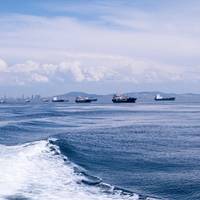
The European Union and the United States are now targeting maritime protection and indemnity (P&I) insurance clubs to limit Russian shipping capacity and cap the price of its oil, meaning we’re finally beginning to see some smart sanctions for a stupid war.P&I clubs are maritime insurance groups that specialize in open-ended, large-risk claims. P&I insurance is a requirement for all heavy cargo and container vessels. Under the new sanctions, European P&I clubs can no longer offer insurance to a vessel carrying Russian oil at a price higher than $60 a barrel.Since February 2022…
Insights from the 50th International Congress of Maritime Museums
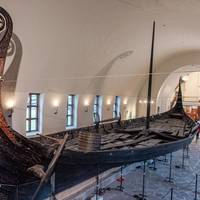
For many, the ocean is life. It provides transportation, work, commerce, food, recreation—tales as old as time and shared by people across the globe. These stories are lived day to day, passed down between generations, and shared with the public through various media. Maritime museums assume responsibility to share these histories while honoring the communities shaped ocean exploration and commerce. In a decade where ocean health and climatic events have become a primary focus…
Academia’s Climate Change Challenge is Far from Academic
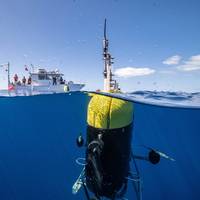
Highlighted in Marine Technology Reporter's MTR100 is the work and technology ongoing in the halls of academia. The most recent report released by the UN Intergovernmental Panel on Climate Change emphasized our warming planet, an expected announcement for many in the scientific community. Faced with the confirmation that human activities have caused an increase in global temperatures, research has turned to seeking answers in the planet’s natural systems. How does each part of the global carbon cycle work and how may it be impacted by the changing climate?
How Shipping Ports Can Become More Sustainable
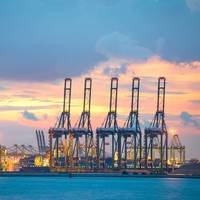
Marine shipping drives 90% of global trade, moving over 11 billion tonnes of containers, solid and liquid bulk cargo across the world’s seas annually. Almost all consumer products we buy — or the raw materials required to make them — arrive at Canadian ports via ship.Each year, Canadian port facilities handle about 340 million tonnes of goods, worth about $400 billion. Roughly 25% of Canadian exports and imports, by value, are transported by marine shipping.Despite their economic importance…
Alberta Oil Shipped Through Panama Canal to Atlantic Canada
On July 20, the tanker Cabo de Hornos delivered an estimated 450,000 barrels of crude oil to the Irving Oil refinery’s Canaport storage facilities in Saint John, N.B.What made Cabo de Hornos’s delivery different was that it was the first time crude oil had arrived in Saint John by ship from Alberta. It came via the Trans Mountain pipeline to the Westbridge Marine Terminal in Burnaby, B.C., and then through the Panama Canal.By the end of April next year, a second tanker will arrive at Canaport carrying 350,000 to one million barrels of Western Canadian crude oil. In this case, the oil will have come via pipeline from Alberta to a crude oil exporting terminal in Texas or Louisiana.For most of the Saint John refinery’s 50 years of operation…
Environmental DNA Emerging in the Ocean Science Community
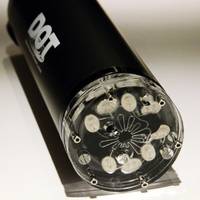
There is a new buzzword in the ocean science/sensing community. The word is eDNA, an abbreviation for environmental DNA. This refers to DNA that can be extracted from environmental samples without first isolating any target organisms. In the maritime community such samples are taken from water. All living organisms leave traces of DNA in their environments which is an indicator of their presence over time. This DNA is released into the environment through the biological process of living animals or by the decomposition of dead organisms.
IBM Canada Joins COVE
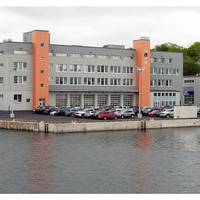
COVE has announced that IBM Canada has joined the ocean business park as a tenant, one of 50 currently in residence.IBM is one of Canada’s top 10 private research and development investors and last year contributed more than $478 million to Canadian research activities. In September 2018, it was revealed that IBM, along with COVE, Dalhousie University, the Ocean Frontier Institute, the Government of Canada, local industry and the Province of Nova Scotia, were collaborating on…
Jamaican Elected to WMU Board
Maritime Authority of Jamaica’s (MAJ) Director General Rear Admiral Peter Brady has been elected as the Vice Chairman of the Board of Governors of the World Maritime University (WMU) in Malmo, Sweden. The appointment has been welcomed by Jamaica’s maritime community as recognition for the MAJ’s focus on training and the Admiral’s crucial role within the international shipping sector. served as a visiting lecturer between 2003 and 2004. He has been a serving member on the WMU Board of Governors since 2007. Admiral Peter Brady said: “This recognition is good for Jamaica’s reputation as a Maritime State and confirms its status as a member of Council of the IMO in Category C”.
MAJ Dir. Gen. Receives Global Award
Rear Admiral Peter Brady, Director General of the Maritime Authority of Jamaica, was deeply honoured to receive the prestigious IMO Themed Award for World Maritime Day 2015 "Maritime education and training", sponsored by the China Classification Society, at last night’s 27th Seatrade Awards Ceremony. The Admiral’s award was in recognition of his dedicated work in the sphere of maritime training. Rear Admiral Brady chaired the International Maritime Organisation’s (IMO) STW Sub Committee for almost 10 years and was Chairman of the Committee of the Whole at the Diplomatic Conference in Manila which amended the STCW Convention and STCW Code.
AAPA Elects Quinn as Chairman of the Board

The American Association of Port Authorities (AAPA) elected Jim Quinn, president and CEO of New Brunswick, Canada’s Port Saint John, to serve as the international trade association’s chairman of the board for the 2015-16 activity year. Elected at AAPA’s 2015 Spring Conference on April 21, Quinn is slated to be installed as AAPA’s chairman for a one-year term on the final day of the association’s 104th Annual Convention, set for Nov. 2-4, 2015, in Miami. He will assume the AAPA chairmanship from Port of Hueneme (Calif.) CEO and Port Director Kristin Decas…
Ports Workshop to Explore Maritime Economic Drivers
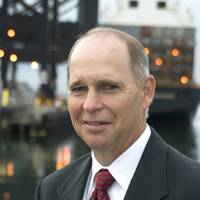
The American Association of Port Authorities’ (AAPA) 2013 Maritime Economic Development Workshop in Chicago, June 27-28, will explore the factors driving today’s investments in seaport and related infrastructure. The program's speakers will analyze the risks and rewards for undertaking such investments, reveal how capital improvements propel business development decisions and discuss what influences intermodal connection improvements with ports. Addressing the issue of what is…
Lockheed Martin Seeking Atlantic Canada Companies for Shipbuilding Projects
Lockheed Martin Canada, a major supplier of systems, software and professional services to the Royal Canadian Navy, will be in Saint John, Halifax and St. John’s this week to meet with companies that could become partners and suppliers on shipbuilding projects, including the Arctic Offshore Patrol Ships and other future programs. In each location, Lockheed Martin officials will provide a briefing on how companies can prepare and position themselves for shipbuilding work through major contractors and then will conduct a series of one-on-one meetings to learn about the capabilities of many New Brunswick, Nova Scotia and Newfoundland and Labrador based companies.
An Emerging Global Maritime Hub Halifax, Nova Scotia
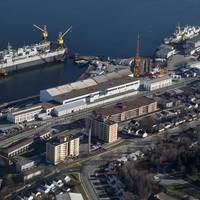
A year after Irving Shipbuilding Inc.’s successful bid to build $25B worth of combat vessels for the Royal Canadian Navy and ships for the Canadian Coast Guard, the largest procurement contract ever awarded in Canada, a positive economic buzz continues to grow across the province and throughout the Atlantic region. It’s an optimism not generated by any other project in many years. The multi-billion dollar package provided through the National Shipbuilding Procurement Strategy (NSPS)…
Shipbuilding in Nova Scotia
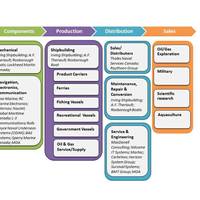
Irving Shipbuilding’s successful C$25 billion bid for the combatant portion of the National Shipbuilding Procurement Strategy (NSPS) illustrates the strength of Nova Scotia shipbuilding industry. Under the program, Irving Shipbuilding, Inc. (ISI) will build six to eight Arctic/Offshore Patrol Ships and 15 Canadian Surface Combatants for the Department of National Defense (DND) over the next 20-30 years. The NSPS contract is in addition to ISI’s contract to build nine mid-shore patrol vessels for the Canadian Coast Guard…
Canada Funds Shortsea Shipping Study
Mr. Geoff Regan, Minister of Fisheries and Oceans announced, on behalf of Transport Minister Jean-C. Lapierre, that Transport Canada will provide close to $26,000 in funding for a study on shortsea shipping on the east coast of North America to be conducted by the Faculty of Management of Dalhousie University. Shortsea shipping refers to the movement of cargo and passengers by water along coastlines, to and from nearby islands, or within lakes and river systems, but without crossing an ocean. Increased use of shortsea shipping could also help ease freight transportation congestion and improve air quality. “This study will assist government and industry in realizing shortsea shipping’s potential by shedding light on the challenges that affect it,” said Mr. Regan.
The Fate of the Iron: More Lessons From The Titantic Tragedy
Tragedies in the maritime industry are often revered, particularly when a large loss of life occurs, as was the case when RMS Titanic sank on April 14, 1912. The industry is also noted for its ability to learn from mishaps, incorporating changes in design, procedures and operations that are designed to avert future mishasps. Lessons learned and positive results occurring in the aftermath of Titanic are numerous and still growing, as a team exploring the formation of rusticles on Titanic's hull are drawing some interesting conclusions regarding the natural removal of iron from steel, and the potential compromise in safety and performance this may have, particularly on double-hulled vessels. The fascination with and examination of Titanic has been thorough, to put it mildly.







